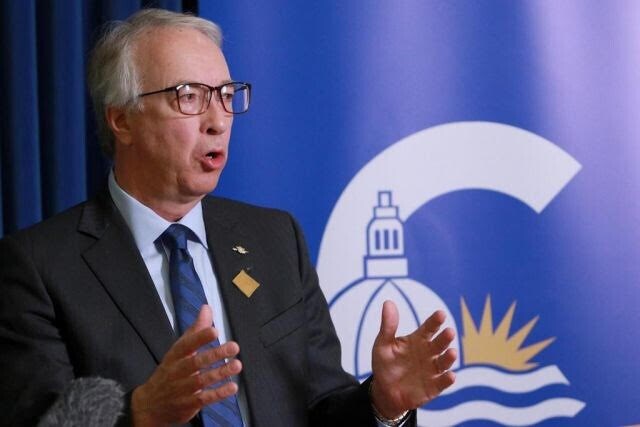BC Conservative Leader John Rustad says the province ought to re-open independent international trade offices in Asia, including in China, to counter tariff threats from U.S. president-elect Donald Trump.
“I would re-open all the trade offices in Asia,” said Rustad Tuesday.
“All countries trade with China, Europe trades with China, the U.S. trades with China
“Now obviously we have to be careful; we have to protect our interests,” said Rustad, whose comments preceded a report Thursday from the Globe and Mail stating Beijing is willing to deepen economic ties amid the frostier U.S.-Canada relations.
BIV had reached out to Rustad for comment on Premier David Eby’s “three keys” to countering the tariff threat.
Eby said Tuesday he will speak to other premiers to: craft retaliatory tariffs; ensure the provincial economy is responding with necessary and expedited permitting of projects; and seek to diversify trade partners, ensuring “we can replace U.S. customers.”
Rustad panned Eby’s three-point plan, saying the BC NDP has fallen short of diversifying trade, as exemplified by the closure of the independent offices, which were created by the previous BC Liberal government.
Between 2013 and 2017 the offices expanded under the watch of former B.C. international trade minister Teresa Wat, who Rustad chose to run with his party after BC United (formerly the BC Liberals) folded before the election campaign last September.
Wat was instrumental in crafting a memorandum of understanding for the B.C. government on China’s Belt and Road Initiative. The BC NDP allowed the five-year MOU to expire.
Provincial international trade policy was never discussed during the 2024 fall election campaign.
In December 2019 the provincial government co-located all the trade offices in Asia into Canadian embassies and consulates. While this occurred weeks following the detention of Huawei Technologies Co. Ltd. CFO Meng Wanzhou in Vancouver and the subsequent detention of two Canadians in China, the stated reasons were cost savings and to be more closely aligned with the federal government.
In 2019 B.C. spent $7.4 million, including $1.6 million on office space within Asia. About $2 million was spent in Beijing. In 2023 B.C. spent about $6 million dollars to operate the offices out of the embassies and consular offices in: Ho Chi Minh City, Jakarta, Manila, Singapore, Beijing, Chongqing, Guangzhou, Shanghai, Bangalore, Chandigarh, Mumbai, New Delhi, Seoul and Tokyo.
The U.S. remains by far the largest trading partner for B.C. (54 per cent of exports) however the province is far less dependent on it than Canada, which ships about 75 per cent of its exports to the U.S.
In 2024, excluding December, B.C. saw a drop in exports to the U.S. (-6.5 per cent to $26.4 billion) and an increase to mainland China (+9.3 per cent to $7.8 billion), according to the provincial government.
Eby not focusing enough on border security: Rustad
Rustad also criticized Eby’s other two points, stating B.C. is slowing permitting by applying legislation recognizing the United Nations Declaration on the Rights of Indigenous Peoples (UNDRIP) on resource projects, thus enabling First Nations to block permitting.
Rustad campaigned on repealing the UNDRIP legislation.
Rustad also said Eby misses the point on acknowledging Trump’s concerns over border security and organized crime, namely illicit fentanyl production and distribution.
Rustad said he would have the provincial government establish its own port police and “send the bill to Ottawa” if the federal government does not step up.
As it stands, less than one per cent of containers are searched in B.C. ports.
“It’s crazy that we’ve allowed this to proliferate without our ports protected; it’s been decades,” since the ports had a dedicated force, said Rustad.
Eby’s government claims it is aware of the situation.
Minister of Public Safety and Solicitor General Mike Farnworth wrote to the federal government last September, “urging them to increase enforcement and to pursue efforts in closing the gaps in federal legislation and regulations that organized crime groups are exploiting at our ports,” the ministry told BIV via an email statement.
“Since 2020, B.C. has witnessed an increase in the illicit domestic production of fentanyl and other synthetic drugs, facilitated by the importation of chemical precursors from China,” the ministry stated, adding:
“B.C. ports should never be an enabling mechanism to move illegal cargo into and out of the province. The province remains absolutely committed to working with our federal, provincial and municipal counterparts to ensure that smart and coordinated action is taken to effectively tackle organized crime in B.C. and improve the security at our ports.”


